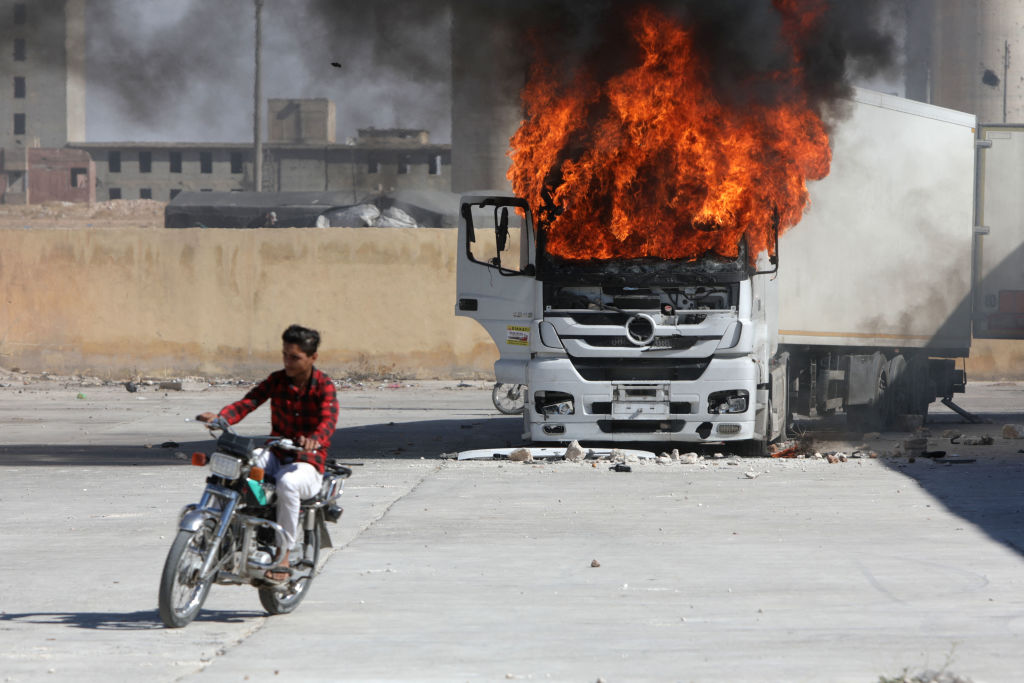At first glance, there is no obvious link between Turkey’s ongoing wave of nocturnal pogroms against Syrian refugees and the Gaza War. Yet, along with other developments in the Middle East, both indicate the scrambling of the alliance systems of the 2010s and the birth of a new regional political order.
The initial spark for Turkey’s disorder was the alleged sexual harassment of a child by a Syrian refugee in the central city of Kayseri. The violence spread across the country with riots as far apart as Gaziantep in the southeast and Istanbul in the northwest. It is an unsurprising boiling over of the inter-ethnic tensions resulting from Turkey’s initial welcoming of more than three million Syrian refugees over a decade ago.
Yet the retaliatory spread of clashes to Turkish-held regions of northern Syria — which have now forced Turkey to close its main border crossings into the region — reveals their geopolitical aspect, symptoms of a rapidly changing Middle East. From the first Syrian protests against Bashar al-Assad’s dictatorial rule in 2011, the 2010s were marked by the emergence of a fractious Sunni bloc of regional powers providing support to Syrian rebel forces, counterbalanced by intervention on Assad’s side by Shia Iran and its powerful Lebanese auxiliary force Hezbollah. This regional rivalry did much to sectarianise the increasingly bloody civil war, with disastrous effects for the country.
Following the failure of Turkish-backed Syrian Sunni rebels to overthrow the Assad regime which was supported by the Russian military, Recep Tayyip Erdoğan deployed the Turkish army to seize large portions of northern Syria along the border. The land was increasingly incorporated into Turkish bureaucratic structures, but kept firmly separated by a strictly-guarded border. The result, however, was a relatively stable quasi-annexation of Syrian territory.
Halfway through the 2020s, the gears of geopolitics grind on with unpredictable effects. Like the Arab League’s recent (and apparently retracted) rapprochement with Hezbollah, itself a result of the Gaza War and Israel’s threatened invasion of Lebanon, the sectarian divisions of the 2010s are fading, replaced by the new great game of shifting regional alliance systems.
Erdoğan condemned Israel’s mooted invasion of Lebanon and the West’s support of Israel, saying: “Countries that gloat over freedom, human rights and justice have become slaves to a mentally ill person like Netanyahu.” This, predictably, drew a furious response from Israel’s Foreign Minister Israel Katz, who accused the Turkish leader of having “announced his support for Hezbollah against Israel’s threats”.
While Katz’s rebuke goes too far, there is a kernel of truth to it: Turkey under Erdoğan is only becoming more sympathetic to the Muslim world and cynical of the West. Hamas, an outcrop of the Sunni Muslim Brotherhood whose militias backed by Turkey and Qatar were once locked in bitter struggle against Assad and his Shia supporters, is now firmly back within the Resistance fold.
The intra-Muslim sectarian rivalries of the 2010s are fading as the Middle East evolves to meet a rapidly changing political landscape. In Lebanon, Hezbollah has undertaken recent outreach to the Muslim Brotherhood, whose local Fajr militia, permitted to publicly display itself in shows of strength, has taken casualties in the border clashes with Israel.
But most significantly of all, it is Turkey’s outreach to Assad driving fear and anger among Syrians in the Turkish-held border areas. The Turkish-backed proxy militias are also feeling this anger and for the first time engaged in serious clashes with their sponsors, the Turkish army. With Russian, Iraqi and Iranian backing, the bloody rift between Erdoğan and Assad appears to be healing, helped along by the perception that the region’s new contours are being drawn.
A likely Trump victory in the coming US presidential election bodes ill for the US-backed Kurdish-led SDF forces in northeastern Syria. Still, the prospect of reconciliation between Erdoğan and Assad also poses genuine risks to the Sunni rebels fractiously gathered under Turkey’s wing. Assad’s precondition for talks with Erdoğan is a Turkish withdrawal from northern Syria.
Until recently, this was a non-starter, but the clashes in both the Turkish occupation zone and Turkey itself may alter Erdoğan’s calculations. The bitter and bloody rivalries of the 2010s, like their complimentary alliance systems, may not long survive the regional realpolitik of the very different 2020s. And, once again, ordinary Syrians will be the victims.











Join the discussion
Join like minded readers that support our journalism by becoming a paid subscriber
To join the discussion in the comments, become a paid subscriber.
Join like minded readers that support our journalism, read unlimited articles and enjoy other subscriber-only benefits.
Subscribe